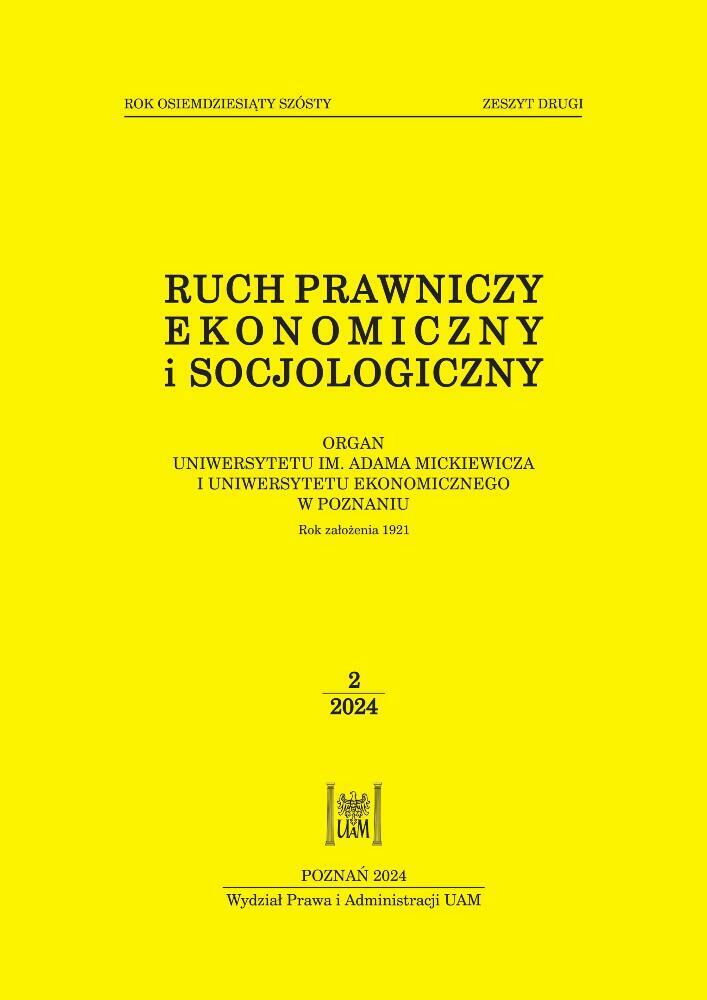Abstrakt
The research presented in the article aims to identify the criteria for determining the law applicable to third party claims against board members and parent companies for non-contractual obligations. The article examines the provisions of EU law and the case law of the Courts of Justice on the basis of the dogmatic method, combined with elements assessing the economic efficiency of the identified approaches. Research on this topic is prompted by the absence of an adequate legal framework determining the qualification of the claims in question. The Rome II Regulation only provides for the exclusion of company law claims from its scope. However, this exclusion does not provide criteria for determining which claims fall under company law. This issue was recently addressed by the Court of Justice in the case of BMA AG, C-498/20, concerning the scope of the law applicable to the liability of a German company for breach of the general duty of care towards the creditors of a Dutch subsidiary. The Court held that such a claim should be classified as lex delicti. The findings of the research suggest that the Court of Justice has not offered clear criteria that would enable national authorities to distinguish between corporate and tort claims. Meanwhile, it seems that there are more arguments in favour of the corporate nature of claims arising from decisions relating to the management of the company’s assets.
Bibliografia
Baratta, R. (2009). The process of characterization in the EC conflict of laws: Suggesting a flexible approach. In P. Sarcevic, P. Volken & A. Bonomi (Eds.), Yearbook of Private International Law (pp. 155–169). Kluwer Law International. DOI: https://doi.org/10.1515/9783866537170.2.155
Bariatti, S. (2017). Classification (characterization). In J. Basedow, G. Rühl, F. Ferrari & P. De Miguel Asens (Eds.), Encyclopedia of private international law (pp. 358–365). Edward Elgar Publishing.
Collier, J. G. (2001). Conflict of laws. Cambridge University Press. DOI: https://doi.org/10.1017/CBO9781139164627
Ebke, W. (2002). The “real seat” doctrine in the conflict of corporate laws. International Lawyer, 36(3), 1015–1038. https://scholar.smu.edu/til/vol36/iss3/13
Gerner-Beuerle, C., Mucciarelli, F., Schuster, E.-P., & Siems, M. (2019). The private international law of companies in Europe. C. H. Beck. DOI: https://doi.org/10.17104/9783406759062
Gerner-Beuerle, C., Mucciarelli, F., Schuster, E.-P., & Siems, M. (2020). Making the case for a Rome V Regulation on the Law Applicable to Companies. Yearbook of European Law, 39, 459–496. DOI: https://doi.org/10.1093/yel/yeaa007
Gurrea-Martínez, A. (2021). Towards an optimal model of directors’ duties in the zone of insolvency: An economic and comparative approach. Journal of Corporate Law Studies, 21(2), 365–395. DOI: https://doi.org/10.1080/14735970.2021.1943934
Heiss, H., & Kaufmann-Mohi, E. (2016). Classification: A subject matter for a Rome 0 regulation? In S. Leible (Ed.), General principles of European private international law (pp. 87–100). Kluwer Law International.
Kindler, P. (2021). Internationales Handels- und Gesellschaftsrecht. In F. J. Säcker, R. Rixecker & H. Oetker (Eds.), Münchener Kommentar BGB: Band 13. IPR II, Internationales Wirtschaftsrecht, Art. 50–253 EGBGB (pp. 1589–1950). C. H. Beck.
Looscheiders, D. (2004). Internationales Privatrecht – Article 3–46 EGBGB. Springer. DOI: https://doi.org/10.1007/978-3-642-18667-7
Magnus, U. (2005). Art. 10:101. Nature and Purpose of Damages. In European Group on Tort Law (Ed.), Principles of European tort law – Text and commentary (pp. 149–153). Springer.
Manesh, M. (2021). The corporate contract and the internal affairs doctrine. American University Law Review, 71, 501–577. DOI: https://doi.org/10.2139/ssrn.3904968
Renner, M. (2014). Kollisionsrecht und Konzernwirklichkeit in der transnationalen Unternehmensgruppen. Zeitschrift für Unternehmens- und Gesellschaftsrecht, 43(4), 452–486. DOI: https://doi.org/10.1515/zgr-2014-0452
Ringe, W.-G. (2013). Corporate mobility in the European Union – a Flash in the Pan? An empirical study on the success of lawmaking and regulatory competition. European Company and Financial Law Review, 10(2), 230–267. DOI: https://doi.org/10.1515/ecfr-2013-0230
Ringe, W.-G. (2017). Kornhaas and the challenge of applying Keck in establishment. European Law Review, 42(2), 270–279.
Szydło, M. (2017). Directors’ duties and liability in insolvency and the freedom of establishment of companies after Kornhaas. Common Market Law Review, 54, 1853–1866. DOI: https://doi.org/10.54648/COLA2017152
Thölke, U. (2022). Grundlagen. In S. Leible & J. Reichert (Eds.), Münchener Handbuch des Gesellschaftsrechts: Vol. 6. Internationales Gesellschaftsrecht. Grenzüberschreitende Umwandlungen (pp. 1–52). C. H. Beck.
Licencja
Prawa autorskie (c) 2024 WPiA UAM

Utwór dostępny jest na licencji Creative Commons Uznanie autorstwa 4.0 Międzynarodowe.





